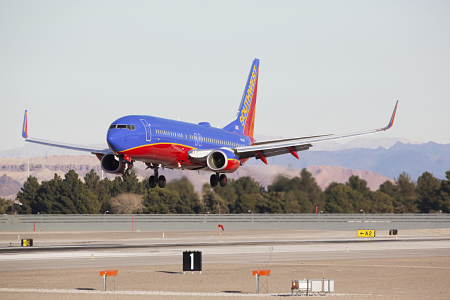Lyft has teamed with airline powerhouse Southwest Airlines Co. in a collaboration that will offer first-time Lyft customers who are also Rapid Rewards Members a one-time reward of 1,100 Rapid Rewards points for their first ride.

The offer is available for a ride anywhere in the following 11 Southwest markets where Lyft has an operating agreement in place through the end of 2016:
• Austin-Bergstrom International Airport
• Chicago Midway International Airport
• Dallas Love Field
• Los Angeles International Airport
• Louisville International Airport
• McCarren International Airport (Las Vegas)
• Nashville International Airport
• Oakland International Airport
• Reagan National Airport (Washington, D.C.)
• San Antonio International Airport
• San Diego International Airport
A separate offer is currently available to Southwest customers who are not Rapid Rewards members in the markets listed above, offering $15 off a first-time ride with Lyft. The two offers cannot be combined.
"At Southwest, we're known for low fares and great hospitality—whether on the ground or in the air. Rideshare is a natural extension to air travel," said Bob Jordan, executive vice president and chief commercial officer at Southwest Airlines. "It offers an easy, hassle-free way to get to the airport and saves time and money on short- and long-term parking. Lyft makes sense for Southwest as a rideshare partner. Like Southwest, Lyft is customer-focused and seeks to offer delightful and seamless travel experiences."
Lyft, an app that can be used on iOS or Android, was founded in June 2012 by Logan Green and John Zimmer to reconnect people and communities through better transportation.
Lyft is the fastest growing rideshare company in the U.S. and is available in more than 200 cities. Preferred by drivers and passengers for its safe and friendly experience, Lyft is committed to affecting positive change for cities. This promotion is part of a larger effort as Southwest explores increasing rideshare options.
"Partnering with Southwest, the country's largest domestic air carrier is incredibly exciting, especially given our companies' shared commitment to treating people better," said Zimmer. "We look forward to Southwest customers enjoying affordable and delightful door-to-door rides through the Lyft app."
Based on the U.S. Department of Transportation's most recent data, Southwest Airlines is the nation's largest carrier in terms of originating domestic passengers boarded. The company operates the largest fleet of Boeing aircraft in the world.
Lyft’s good news with Southwest came about a week before U.S. District Judge Vince Chhabria threw out a $12.2 million settlement Lyft had agreed to pay to its drivers in a proposed lawsuit settlement.
In a 21-page order Chhabria says the $12.2 million payment seriously shortchanges the proposed class of drivers—and the state of California. Plaintiffs' lawyers said the $12.25 million was a reasonable cut for the $64 million that drivers deserved for mileage reimbursements they would have received as employees. But Chhabria's calculation of that reimbursement, using the drivers' own methodology, was that it's worth more than $126 million.
"The drivers were therefore shortchanged by half on their reimbursement claim alone," he concludes.
In addition, the drivers had a claim for penalties under the Private Attorneys General Act (PAGA), a law that allows for private enforcement of state labor laws with the state receiving 75 percent of the proceeds. Under the proposed deal, the PAGA portion of the claim was discounted to $122,250, less than 1 percent of the total settlement.
Chhabria says the PAGA penalty "makes no sense" and was created with an "arbitrary" calculation. "Nor did either side have a rational explanation for the value assigned to the PAGA claim, or for why they attributed such a minuscule portion of the settlement to that claim."
If all drivers in the class had made a claim, the $12.25 million settlement would have resulted in an average payout of $53.02 to part-time drivers and $676.19 to full-time drivers. That figure gives a 50 percent "premium" to the full-time drivers' claims, since in the judge's view they likely had a stronger case for being misclassified as contractors.
The Teamsters union, which is seeking to represent Lyft drivers, also objected to the settlement, saying that it should have changed the drivers' classification to employees.
Chhabria mostly discounts the Teamsters' claims, saying they are policy concerns better directed to the legislature. He says the union's assertion that the changes are "largely illusory" is likely an overstatement. "The changes aren't revolutionary, but they are not nothing, either," Chhabria writes.
Former Lyft drivers Patrick Cotter and Alejandra Maciel sued Lyft in 2013, saying they shouldn't have been classified as contractors. The suit said they were denied breaks, overtime pay, and other benefits of being an employee.
